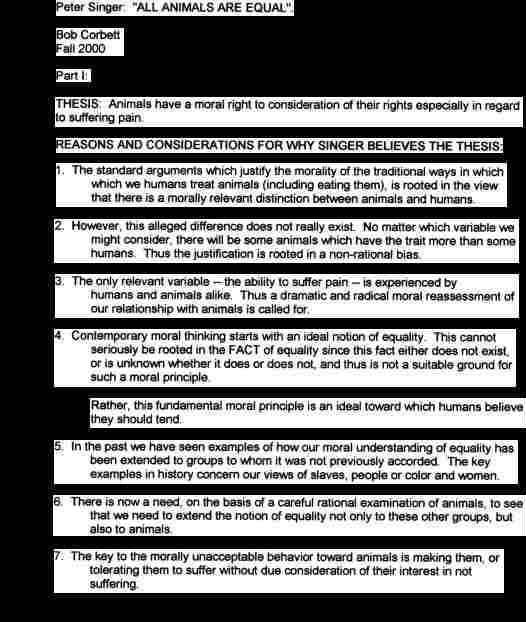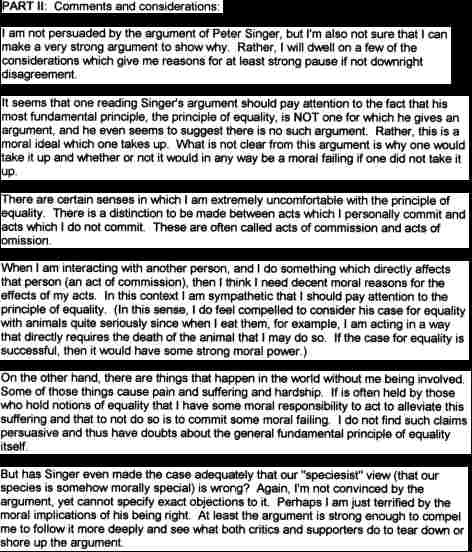Bob Corbett, August 2000
Peter Singer: "ALL ANIMALS ARE EQUAL".
Bob Corbett
Fall 2000
Part I:
THESIS: Animals have a moral right to consideration of their rights especially in regard to suffering pain.
REASONS AND CONSIDERATIONS FOR WHY SINGER BELIEVES THE THESIS:
Rather, this fundamental moral principle is an ideal toward which humans believe they should tend.
PART II: Comments and considerations:
I am not persuaded by the argument of Peter Singer, but I'm also not sure that I can make a very strong argument to show why. Rather, I will dwell on a few of the considerations which give me reasons for at least strong pause if not downright disagreement.
It seems that one reading Singer's argument should pay attention to the fact that his most fundamental principle, the principle of equality, is NOT one for which he gives an argument, and he even seems to suggest there is no such argument. Rather, this is a moral ideal which one takes up. What is not clear from this argument is why one would take it up and whether or not it would in any way be a moral failing if one did not take it up.
There are certain senses in which I am extremely uncomfortable with the principle of equality. There is a distinction to be made between acts which I personally commit and acts which I do not commit. These are often called acts of commission and acts of omission.
When I am interacting with another person, and I do something which directly affects that person (an act of commission), then I think I need decent moral reasons for the effects of my acts. In this context I am sympathetic that I should pay attention to the principle of equality. (In this sense, I do feel compelled to consider his case for equality with animals quite seriously since when I eat them, for example, I am acting in a way that directly requires the death of the animal that I may do so. If the case for equality is successful, then it would have some strong moral power.)
On the other hand, there are things that happen in the world without me being involved. Some of those things cause pain and suffering and hardship. If is often held by those who hold notions of equality that I have some moral responsibility to act to alleviate this suffering and that to not do so is to commit some moral failing. I do not find such claims persuasive and thus have doubts about the general fundamental principle of equality itself.
But has Singer even made the case adequately that our "speciesist" view (that our species is somehow morally special) is wrong? Again, I'm not convinced by the argument, yet cannot specify exact objections to it. Perhaps I am just terrified by the moral implications of his being right. At least the argument is strong enough to compel me to follow it more deeply and see what both critics and supporters do to tear down or shore up the argument.
Photo copy of the paper as printed out
Page 1

Page 2

| My Philosophy Page | Webster U. Philosophy Department |
| Animals | Children | Critical Thinking | Current Semester | Education | |
| Existentialism | Miscellaneous Topics | Moral Philosophy | Peace Issues | Voluntary Economic Simplicity | |
Bob Corbett corbetre@webster.edu